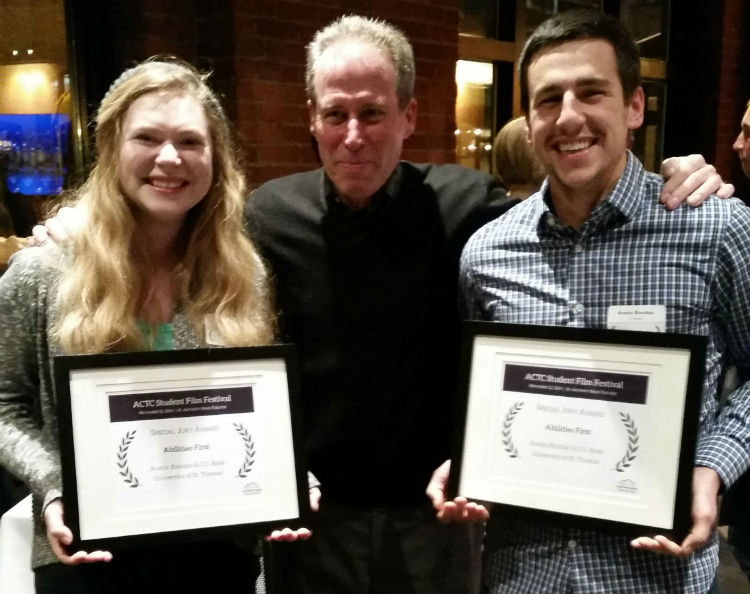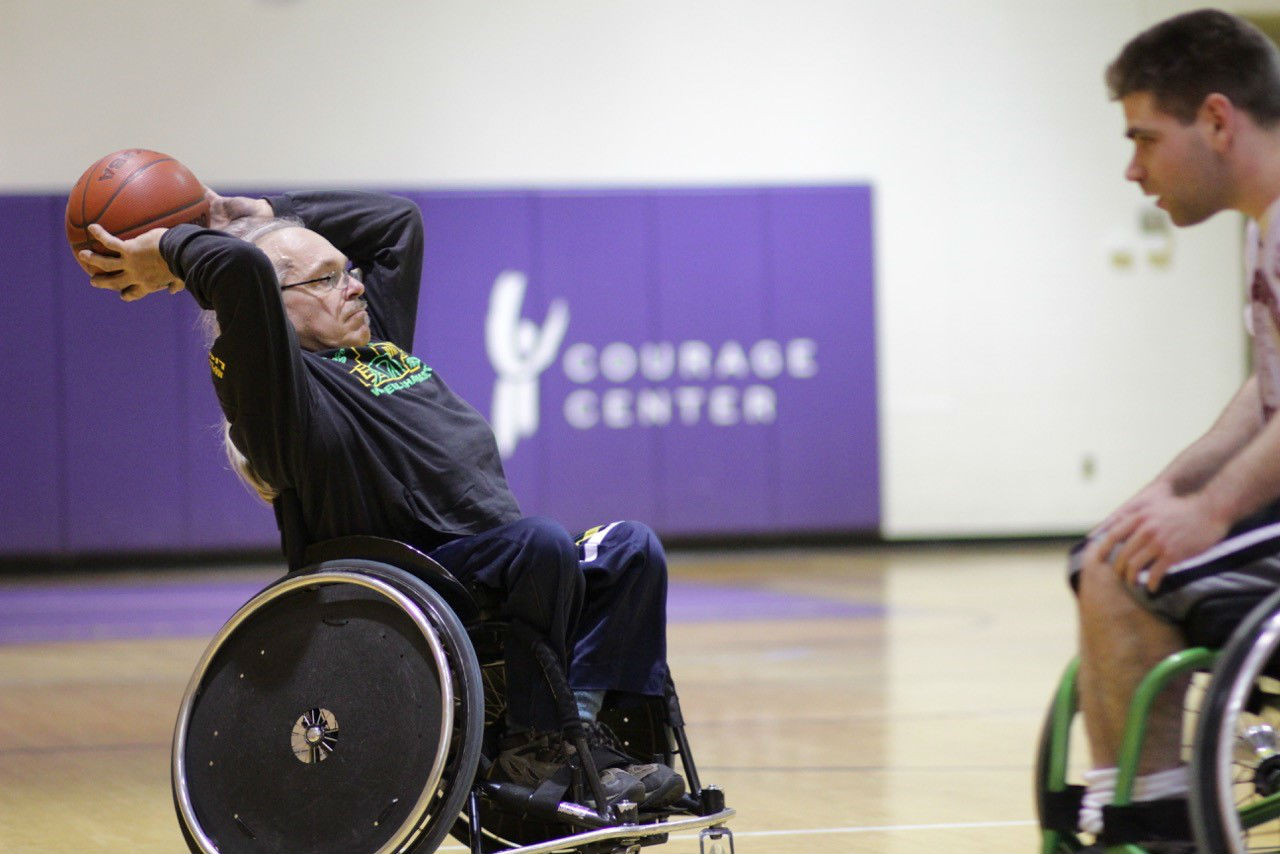Subtitles accompany Ashley Bailey as she speaks on screen, so your eyes take in the message as well as your ears. Really, though, it’s your heart the words are meant for.
“Our disabilities are on the surface,” Bailey says, “But as people get to know me they’ll realize the abilities I do have. And I think it’s worth it to take the time to meet a person and know the many abilities that people with disabilities have.”
Bailey is one of several subjects of “Abilities First,” a documentary by St. Thomas seniors Austin Riordan and Caroline Rode that recently won the Special Jury Award in the Associated Colleges of the Twin Cities Student Film Festival. The movie features the stories of people with disabilities and weaves together a message that society’s focus shouldn't be on what people are not capable of, but what they are.
“The people in the documentary are what made it. It was just putting their stories out there,” Riordan said. “It was a huge learning experience.”

Caroline Rode (left) and Austin Riordan (right) stand with retired St. Thomas Communications and Journalism professor Tim Scully after receiving awards at the Associated Colleges of the Twin Cities Student Film Festival. (Photo courtesy of Austin Riordan)
"I don’t think I’ve ever learned more"
Encompassing several months, dozens of interviews, and countless filming and editing hours, the film gave Riordan and Rode the chance to take ownership of a massive project from start to finish. At its initial conception the idea was simply to “do something that supports the common good in the Twin Cities,” and, at first, focused on “The Amazing Jeffo,” a blind magician. From there other stories came to their attention: an effort in Faribault, Minnesota, to put names on the graves of people who died at mental institutions and were buried with just numbers engraved on headstones; a couple who both have physical disabilities and are raising their 2-year-old daughter together; a two-time Paralympics medal winner; and several others that, together, form this narrative of people with abilities just living their lives.
“When we consulted people in this community about the language and how to get this right, they said to focus on the people and their abilities, not about the disability, the wheelchair or the crutches,” Riordan said. “It’s focusing on the people; that’s really what hit home.”
Crafting such a message through film is no small task and speaks not only to Riordan's and Rode’s skills, but what they were asked and educated to do in class. Film studies professor James Snapko said there is more and more emphasis at St. Thomas on providing students opportunities for hands-on work, such as this project in a communications and journalism course.
“We want to encourage and inspire these students more to work with their craft, so when they graduate it's just taking that next step,” he said. “With the passion some of these students show (with these projects), that's a good sign.”
That educational path isn’t lost on Riordan and Rode.
“I don’t think I’ve ever learned more in such a short period of time,” Riordan said. “That I was able to go outside and apply the things I’ve learned from my classes, and to learn so many new things I never thought of, was fantastic.”
“We learned so much more than we thought we would,” Rode added. “Being able to do something that had impact outside of the classroom was more valuable than doing something in the classroom that you’ll apply later in life. We were applying this stuff as we were in the learning process. I’m very thankful we got to do something like this that most students don’t.”
‘No more valuable experience’
Another aspect of outside-the-classroom impact is the students getting to show their work to an audience, which is “the most important thing,” Snapko said. “That's the best feeling for a filmmaker … to get some kind of response and connect with people. That's when it gets rewarding. When it resonates with them in some way. If that happens ... there is no more valuable experience.”
For Riordan and Rode that experience came well before the film festival: In May they screened their movie at St. Thomas in the OEC auditorium, drawing nearly 200 people between the film’s cast, family, friends and visitors.
“It felt like just another big project until the premier. Getting to see the people we had spent so much time with on our own, and having them all together,” Rode said. “The cast, a few of their moms came up and said, 'Thank you for what you did. You spotlighted the good in my son or daughter.' That was like, ‘Whoa, these are real people. This has a real impact.’”
“I started tearing up in the theater; it was the first time I had seen it not in different segments and editing it,” Riordan said. “Being in there and looking up to see it, hear everyone’s reaction and see how engaged they were in the film, was probably the most rewarding time I’ve ever had. Sitting there and realizing that this is a really good message people were engaged with … it was just awesome to be there in the theater.”
Looking ahead, Riordan plans to continue work with his own production company, and Rode hopes to pursue behind-the-camera work in journalism. Finishing this project together also has given them a glimpse of what their backup plan could be.
“We’ve been joking that in a few years if we don’t have solid work that we’ll travel the world and do a documentary together,” Rode said.
With one award-winning effort under their belt already there’s reason to expect Riordan and Rode would be ready for such a project. Expanding their lens beyond the common good of the Twin Cities, there’s a whole lot of stories just waiting to be told.







